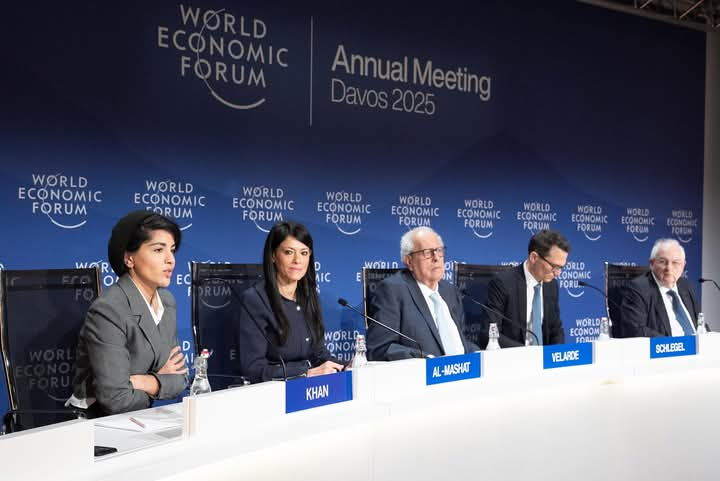
During her attendance at the Davos World Economic Forum in Switzerland, themed “Cooperation for the Smart Age,” Dr. Rania Al-Mashat, Minister of Planning, Economic Development and International Cooperation, participated in several high-level discussion sessions.
These sessions centered on critical issues such as the future of growth, inflation, gender equality, and the development trajectory of the African continent. These topics were prominent across numerous panel discussions at the forum.
Dr. Al-Mashat participated in a meeting of future growth
leaders, alongside Faisal Al-Ibrahim, Minister of Economy and Planning of Saudi
Arabia, Lawrence Summers, Director of the Mosavar Rahmani Center for Business
and Government at Harvard Kennedy School, Raghuram G. Rajan, Professor of
Finance at the University of Chicago Booth School of Business, André Hoffmann,
Chairman of the Board of Directors of Roche, and Samuela Zubiru, President and
CEO of the African Development Bank, among others.
The Minister discussed global growth projections, which are
expected to reach around 3.3% this year and next, according to the World
Economic Outlook issued by the International Monetary Fund. This rate is lower
than the historical average of about 3.7%, with expectations of improved growth
in Sub-Saharan Africa and a slowdown facing Europe and developing countries.
She outlined the national narrative for economic
development, emphasizing that the ministry, through integrated planning and
international cooperation, is working to maximize the benefits of local and
foreign resources for inclusive and sustainable growth.
The merger of the Ministries of Planning and Economic
Development and International Cooperation aims to enhance the ministry's role
in preparing, implementing, and monitoring the economic and social development
plan. It also seeks to stimulate economic diplomacy efforts to drive financing
for development and maximize international partnerships to advance Egypt's
economic development. The ministry is actively leveraging resources from
international institutions to enhance foreign direct investment and localization
efforts.
The Minister also participated in a session titled
'Sustainable Growth in a Turbulent Era,' featuring Kristalina Georgieva (IMF
Managing Director), Mirek Dusek (World Economic Forum Director-General), Gita
Gopinath (IMF First Deputy Managing Director), Rebecca Greenspan (UNCTAD
Secretary-General), and others.
Dr. Rania Al-Mashat stated that global challenges since 2020
and geopolitical tensions have negatively impacted growth, particularly in
developing and emerging economies. She noted that with central banks beginning
to ease monetary policy in 2025, global inflation is anticipated to decrease,
enabling a return to more natural monetary policies that stimulate economic
activity without compromising price stability.
The Minister emphasized that economic diversification is
crucial for sustainable growth, requiring a shift towards productive sectors
and a green economy. This transition will foster new industries and create
numerous job opportunities, necessitating a corresponding upskilling of the
workforce through vocational education and training.
She stressed that while macroeconomic stability is
essential, it alone is insufficient for achieving sustainable and resilient
economic growth. Stability must be complemented by structural reforms that
address short-term imbalances and enhance long-term stability.
In a panel discussion titled "Inflation: Past, Present,
and Future" alongside Julio Velarde (Governor of the Central Bank of
Peru), Martin Schlegel (Chairman of the Swiss National Bank), and Martin Wolf
(Financial Times), Al-Mashat highlighted the significant increase in inflation
rates in Egypt since 2020. This surge was attributed to the COVID-19 pandemic
and its subsequent economic disruptions, which impacted price levels. The
Russia-Ukraine war further exacerbated these inflationary pressures,
contributing to rising inflation across emerging and developing markets.
She explained that Egypt is currently implementing a set of
concurrent and complementary policies at the level of controlling public
finances, targeting inflation rates through monetary policies, as well as
governing investment spending and setting a ceiling for public investments,
leading to a decrease in inflation rates.
The Minister highlighted potential risks to global inflation
from expected protectionist policies in the United States. She also emphasized
the positive impact of the ceasefire in Gaza on regional stability,
particularly the anticipated resumption of Suez Canal navigation, which would
boost foreign currency inflows. The Minister noted that Egypt has proactively
addressed rising inflation since March 2023 and implemented policies to bolster
investor confidence, fostering macroeconomic stability.
Dr. Rania Al-Mashat participated in a session on "Bridging the Gender Gap for Resilient Economies." She emphasized that gender equality is crucial for inclusive growth, economic resilience, and a just transition. She highlighted that closing the gender gap could significantly boost global GDP growth. A 2024 World Bank report suggests that eliminating gaps in employment and entrepreneurship could increase global GDP by over 20% within the next decade.





